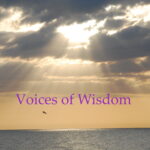Perhaps the one area that can discourage me the most is that for all of my education, reflections, pastoral ministry efforts, the memorable consolations and desolations in my life, prayer, and contemplation, I still feel the same patterns of self-centeredness, judging, egotism, and acedia that have been part of my whole life. One would think that after all the efforts, I would ooze in virtue, peacefulness, serenity, and love. Richard Rohr offers some encouraging guidance on this issue, bringing what appears to be opposites together, that non-dual consciousness of the “both-and.” Like Rohr, my “what, how, and why” personality hasn’t changed, but my awareness of the “who” of me has changed dramatically. Now I can see my so-called personality flaws for what they are worth, not much at all. When I can keep myself in this stance, there is less of a need to justify myself, defend my position or opinion, or run from my shame. This opens up a “new center of gravity” within me that recognizes I am part of something bigger and that I belong to Someone more significant than me.
And so, I find myself right smack in the middle of that second half of life experience, where John 21:18 speaks powerfully about “Being led where you would rather not go.” That “liminal space” Rohr talks about is a void almost haunting in its mystery and beauty. I found this more profound explanation of liminal space by Rohr to be highly moving:
“…a unique spiritual position where human beings hate to be but where the biblical God is always leading them. It is when you have left the tried and true, but have not yet been able to replace it with anything else. It is when you are finally out of the way. It is when you are between your old comfort zone and any possible new answer. If you are not trained in how to hold anxiety, how to live with ambiguity, how to entrust and wait, you will run…anything to flee this terrible cloud of unknowing.”
It is frightening and awesome all at the same time.



Visitor Reflections